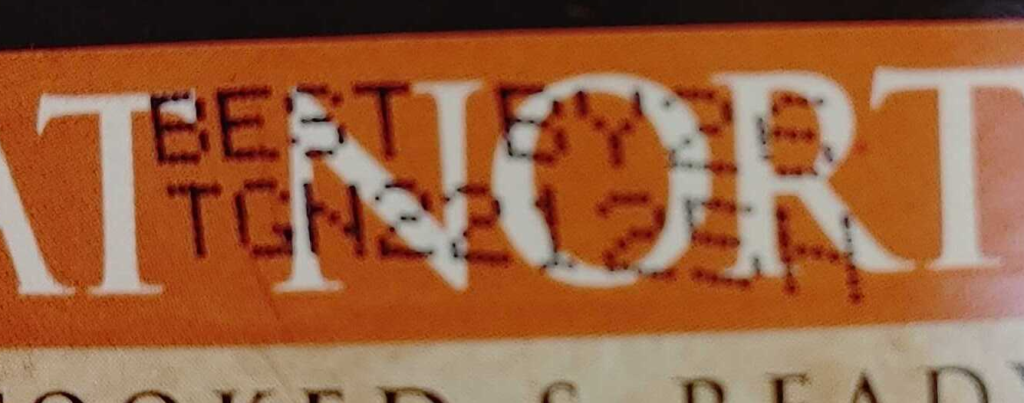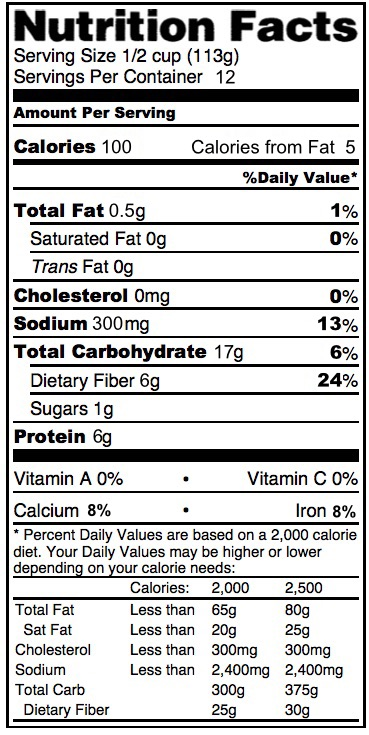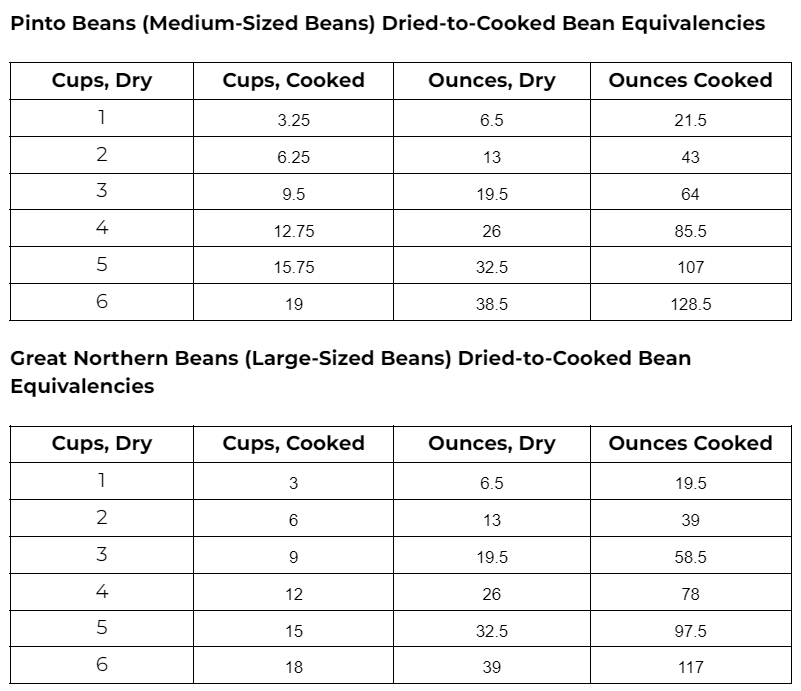FAQ
Frequently Asked Questions
What bean products do you offer?
Randall Great Northern Beans – 24 oz. and 48 oz. jars
Randall Organic Great Northern Beans – 48 oz. jar only
Priority 4-Pack Great Northern Beans – 24 oz. jars only
Randall Pinto Beans – 48 oz. jars only
Randall Ultimate 4-Bean Mix – 48 oz. jar only
Randall Deluxe Bean Mix (7 types of beans) – 24 oz. and 48 oz. jars
How do you know how many cups of beans are in a jar?
48 oz. jar = 4.5 cups of beans, 1.5 cups of liquid.
24 oz. jar = 2 cups of beans, 1 cup of liquid.
What does the product code on the front of the jar mean?

Product code breakdown
- T = where it was produced (Tekonsha, Michigan)
- GN = Great Northern Beans
- 22 = produced in 2022
- 125 = produced on 125th day of Julian calendar (May 5, 2022)
Where are our products produced?
Tekonsha, Michigan
I am unable to find a specific bean in my area. Can you help me locate it?
The grocers and wholesalers we sell to are:
Grocer / Wholesaler
Location
Mitchell Grocery
Albertville, AL
Save-A-Lot
Edwardsville, IL
Rural King
Mattoon, IL
Supervalu Stores (Champaign/Urbana)
Urbana, IL
Winkler Wholesale Grocery
Dale, IN
Super Valu Stores
Fort Wayne, IN
Sam’s DC
Greenfield, IN
Walmart (via Prime)
Plainfield, IN
Ruler Food Stores
Seymour, IN
Save-A-Lot
Yorktown, IN
Hy-Vee Stores/Chariton
Chariton, IA
Hy-Vee Stores/Cherokee
Cherokee, IA
Fareway Wholesale Grocery
Boone, IA
Associated Wholesale Grocers
Kansas City, KS
Save-A-Lot
Winchester, KY
Sam’s DC
Brownstown, MI
Spartan Stores
Byron Center, MI
Meijer, Inc.
Grand Rapids, MI
Great Lakes Foods
Menominee, MI
Save-A-Lot
St. John’s, MI
Super Valu Stores (Minneapolis)
Hopkins, MN
Schnucks Markets
Bridgeton, MO
Associated Wholesale Grocers
Norfolk, NE
C&S Wholesale Grocers
Lancaster, NY
Merchants Distributors
Hickory, NC
Save-A-Lot
Austinburg, OH
Giant Eagle Inc/American Seaway
Bedford Heights, OH
Marc Glassman, Inc.
Brook Park, OH
Nash Finch
Lima, OH
Rural King
Waverly, OH
Supervalu Stores (Pittsburgh)
New Stanton, PA
Giant Eagle Inc/ OK Grocery
Pittsburgh PA
Nash Finch
Sioux Falls, SD
Associated Wholesale Grocers
Goodlettsville, TN
Mid-Mountain Foods/KVAT
Abingdon, VA
Super Valu Stores (Milwaukee)
Green Bay, WI
Certco, Inc.
Madison, WI
Roundy’s Inc.
Oconomowoc, WI
Piggly Wiggly Midwest
Sheboygan, WI
To find a local grocer in your area who carries our product, go to Find A Store.
What’s the nutritional content of Randall Beans?

No hidden preservatives, no concerning chemicals. Just delicious beans ready for you and your family to eat and enjoy.
Are beans a healthy food?
Beans provide these health benefits.
- Much-needed fiber; in fact, they contain “resistant starch,” which is a fiber that moves through to your large intestine, where healthy bacteria in your gut can feed on it.
- Low-fat, low-calorie protein (two or three times more than rice or wheat!)
- Cholesterol-lowering, heart-healthy choice.
- Great for diabetes control, as they are low-glycemic and help control high blood sugar.
A solid source of:
- Iron, to help move oxygen around your body.
- Magnesium, to help you create protein and bone.
- Potassium, which is good for your heart, kidneys, muscles, and nerves.
- Zinc, to fight off germs, make genetic material, and heal wounds.
- Vitamin B for heart health, cell division, and your nervous system.
Who are the people behind Randall Beans?
Scott and Meredith Keating are the co-owners of Randall Beans. Meredith’s father purchased the company in 1974 from the Randall family, who had successfully owned and operated Randall Beans since the late 1800’s. Scott and Meredith acquired and started running the company in 2011, updated the packaging (although we will never stop using those clear, non-tinny-taste glass jars!), and started selling online.
The Keatings also own and run an organic farm, called Open Spigot Farm, which was once the local watering hole for neighbors passing through with their cattle. They are both hands-on farmers, and they are also happy to help out on the production line at Randall Beans.
You can read more in our About Us page.
Do any Randall Beans contain MSG?
Why don’t Randall Beans have a “sell by” or “best date” on them?
What ingredients are in Randall Beans?
Do I have to soak your beans before using?
Is it OK to freeze your beans?
Randall Beans can be frozen in an airtight, moisture-proof container for 2-3 months.
What are the quantity equivalencies between cooked and dried beans?
3 cups of cooked beans = 1 cup of dry beans.
7 1/2 cups of cooked beans = 2 1/2 cups of dry beans = 1 lb. of dry beans.

What is the shelf life of beans?
Is the production date identified on my jar of Randall Beans?
There is a 4-digit numeric code on the side of the lid which identifies the production date.
Where are Randall Beans grown?
Randall Beans selects only the premium beans harvested in the micro-climate of the front range of the Rockies.
Is it possible to order Randall Beans by the case?
Yes, you can order beans by the case from Randall Beans. Go to our Store page to order any of our beans by the case online and have them shipped to you. Also, take a look at our Where To Buy page to find a location near you where Randall Beans are sold.
How are Randall Beans processed?
Do you have any information on the history of Randall Beans?
Randall Beans can retrace its origins to the 1880’s in Tekonsha, Michigan. From its beginnings, Randall used glass packaging. The company was dedicated to the production of high-quality foods. You can find out more on our About Us page.
Where is the Randall Beans plant located?
How do we cook our beans?
Our beans are blanched, filled with a subtle brine (sea salt, non-GMO sugar, and water), sealed and then pressure cooked with strict guidelines determined by a thermoprocessing authority that is FDA-approved.
I can't use an entire 48 oz jar of beans at one time. What do you recommend doing with the leftover beans?
Freeze them! Put the leftover beans in a freezer bag or container with the current date labeled on the bag or the container. Seal tightly and store in your freezer for up to 6 months.
